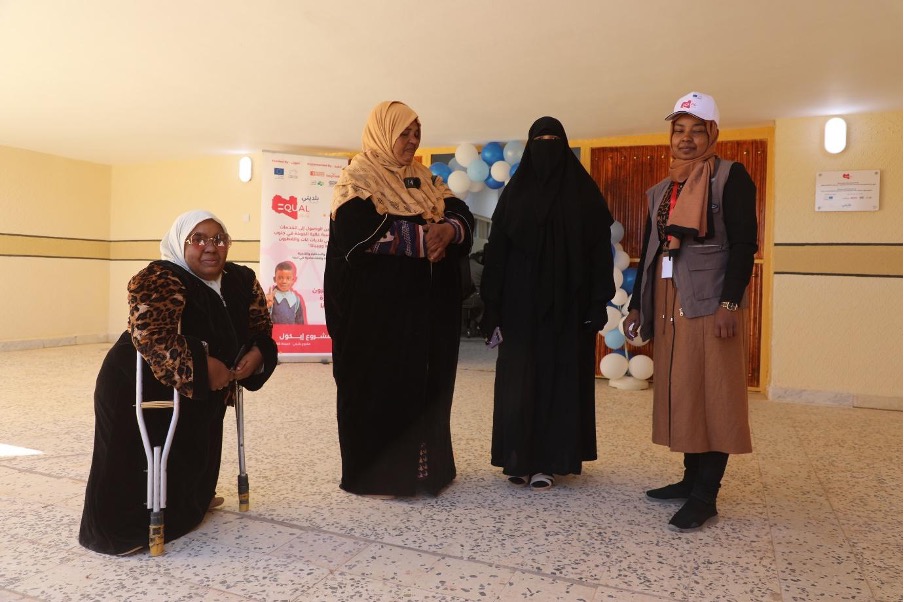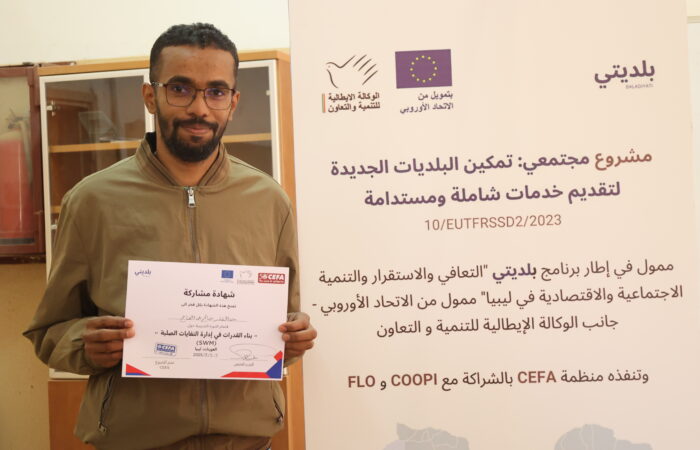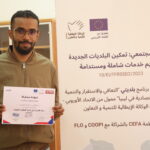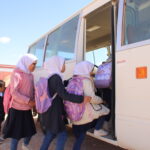This is the story of how the Ghat community, with 9th-grader Nabila as a witness, turned challenges into opportunities for a brighter education. Thanks to EU Baladiyati, AICS, in collaboration with the EQUAL team (featuring Help Code, Première Urgence Internationale, Peaceful Change Initiative, and Pioneers for Development), and with support from the Ministry of Local Governance (MoLG), the Abu Baker Alseddiq school underwent a remarkable transformation.
In the sun-soaked municipality of Ghat, situated in Southern Libya, the Abu Baker Alseddiq school faced numerous challenges that significantly hindered the educational experience of its students. Nabila, a determined 9th-grade student, vividly described the school’s shortcomings, including inadequate lighting, insufficient restroom facilities, discomfort during lunch breaks, and an ongoing foul smell emanating from the sewage system, all of which collectively diminished the students’ enjoyment of their classrooms.
«The insufficient illumination cast a shadow on our ability to fully engage in our studies. It was challenging for me and my fellow students to navigate our lessons effectively», Nabila said reflecting on the poorly lit classrooms. The absence of suitable restroom facilities further exacerbated the challenges faced by the students. Female students, including Nabila, had to venture outside the school premises in search of alternative options, disrupting their education and causing feelings of embarrassment. «I found it humiliating to ask the neighbors to use their restroom», shared Nabila.
Lunch breaks presented an additional obstacle due to the scorching sun, with temperatures in Ghat often exceeding 40 degrees, and in some cases, approaching or surpassing 50 degrees. Limited shade and protection from the harsh rays resulted in discomfort for students attempting to enjoy breaks outdoors, making it impossible to have lunch comfortably.
Thanks to Baladiyati and its EQUAL project, the initiation of the school renovation project infused hope into Nabila, her fellow students, and the broader community. The project aimed to create a school environment that upholds students’ rights and addresses their basic needs. Modern lighting systems were installed to illuminate the classrooms, dispelling the shadows that hindered educational engagement. Simultaneously, the renovation project addressed the pressing need for improved restroom facilities. Modern, hygienic and accessible restrooms were constructed within the school premises, eliminating the need for students to seek alternative options and restoring their sense of dignity. Furthermore, shaded areas were created in the schoolyard, providing students respite from the scorching sun during lunch breaks.
Nabila’s vision of a more inclusive and supportive school environment became a reality, with students now able to relax, socialize and enjoy their meals comfortably. The renovation project wasn’t limited to visible improvements but also aimed to tackle the issue of the foul smell from the sewage system. Nabila shared her relief, saying that «repairs and improvements have been made to the sewage infrastructure, ensuring that our classrooms are no longer plagued by the unpleasant odor. Finally, we can fully focus on our studies without any distractions». As Nabila prepares to graduate and move on to the next phase of her education, heading to high school, her legacy will be marked by the positive changes brought about by the renovation project. The impact of this transformation extends beyond her and her fellows, as future students will benefit from an improved educational environment that respects their rights, addresses their basic needs, and provides a pleasant atmosphere for learning.
The completion of the Abu Baker Alseddiq school renovation project marks a significant milestone in the journey towards a brighter future for communities in Libya. The collaborative efforts of EU Baladiyati and the Italian Agency for development cooperation, through the EQUAL project, have made a lasting impact on the community in Ghat. The remarkable changes have not only empowered and inspired the students but will continue to benefit future generations.
The Baladiyati (My Municipality) Programme – Recovery, Stability, and Socio-economic Development in Libya- is funded by the European Union through the Emergency Trust Fund for Africa (EUFT) and jointly implemented by AICS, UNDP, and UNICEF. The main objective of Baladiyati is to create a more inclusive social and economic environment and enhance stability in the region, providing direct assistance to Libyan municipalities and improving the living conditions of the most vulnerable communities in the country. Since its establishment in 2018, Baladiyati has actively collaborated with nearly 40 municipalities, leveraging expertise, capacities and implementing activities to support local communities. Baladiyati’s specific goals are to improve people’s access to better public services, such as education, healthcare, water, sanitation, and hygiene (WASH), sustainable energy solutions, and livelihood opportunities. Furthermore, the programme strives to strengthen social cohesion and to promote local peacebuilding and resilience.






